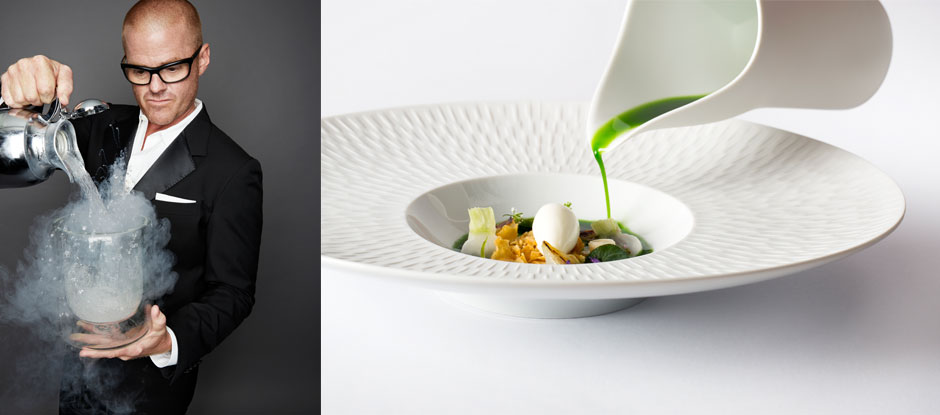Geek. Maverick. Serial headline grabber. Genius. During a career that spans three decades, Heston Blumenthal has won practically every accolade going.
Restaurant magazine’s Joe Lutrario speaks to him as he adds the Diners Club Lifetime Achievement Award to his list.
Heston Blumenthal is making a rare appearance in The Fat Duck’s dining room and all is not going entirely to plan. “They don’t normally let me in here,” he chuckles as we film him preparing a revised version of his iconic nitro-poached mousse palate cleanser. Served from a specially designed trolley, the dish requires Blumenthal to squirt Campari-flavoured mousse out of a siphon and freeze it in a bubbling flask of liquid nitrogen before spritzing it with burnt grapefruit peel.
It’s a procedure that requires considerable dexterity and, by his own admission, he is a little rusty. Liquid nitrogen splashes onto The Fat Duck’s spotless blue carpet as the world-famous chef frantically bastes these fragile, fizzing objects. Restaurant manager Dimitri Bellos looks on impassively at a performance that, at times, brings to mind the final round of The Generation Game.
But the pursuit of perfection is something of a trademark for Blumenthal, and a few takes later he produces a perfect orb of flash-frozen mousse that disappears on contact with the mouth, readying the palate for The Fat Duck’s 17-course, £255 tasting menu. We’re in Bray to film his acceptance speech for The Diners Club Lifetime Achievement Award, an honour that sees the chef join such luminaries as Alain Ducasse, Joël Robuchon, Thomas Keller and Juan Mari Arzak.
Blumenthal is no stranger to awards. His metaphorical mantelpiece is buckling under the weight, in fact. The Fat Duck has reached the number one spot on The World’s 50 Best Restaurants list and has been ranked number two five times. It has three Michelin stars and Blumenthal’s semi-eponymous London restaurant Dinner has two more. He has an OBE, his own coat of arms and an alphabet’s worth of honorary letters after his name.
Is he honoured to add this peer-voted award to his collection? Of course. But much like the chef’s Campari palate cleanser, it is bitter-sweet. “I have mixed emotions,” he says. “It’s a massive honour, but part of you can’t help wondering whether you’re being put out to pasture. This is a major new chapter for me. I consider the past 20 years to have been my apprenticeship. I’m only just getting started.”
Take Heston’s tour of The Fat Duck:
A new chapter begins
A new chapter did begin for Blumenthal a year-and-a-half ago when The Fat Duck reopened following a six-month sojourn in Australia (the Melbourne hotel that housed the sellout pop-up is now home to a permanent incarnation of Dinner). Some £2.5m has been invested in the chef’s flagship (including a staggering £250,000 for the mechanical sweetshop that dispenses the petit fours), which famously employs more than 60 staff to feed 40 customers. While the low-ceilinged dining room retains a similar layout and feel, the rest of the Grade I-listed building has been reworked. Most importantly, long-standing head chef Johnny Lake finally has a kitchen that befits the calibre of the restaurant (its previous incarnation was risibly small, especially considering it has to accommodate 14 chefs in any given service). 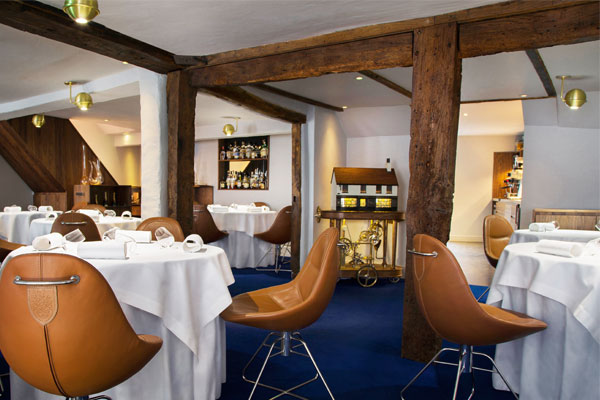
Room for improvement: The Fat Duck's new look
Blumenthal looks re-energised, too. Tanned and garbed in a black T-shirt, loose-fitting jeans and hefty leather boots, he wears his 50 years well. While he doesn’t cook in his restaurants any more, he’s still heavily involved in the research and development side of The Fat Duck and his wider business.
Does he miss the buzz of service? No. “I didn’t miss one service for the first eight years I was at The Fat Duck. I averaged 120 hours a week. I had to work very hard on myself to lose the guilt of leaving the restaurant. But being a chef is part of who I am. At events and launches when I end up cooking I love it. But the thing that excites me is all the new stuff. The learning, the development.”
Blumenthal is a tricky man to interview. He doesn’t dodge questions, but he has an infuriating tendency to wander off topic. Or as he and Lewis Carroll would have it ‘to go down the rabbit hole’. When I ask him to describe his role at The Fat Duck, I get a 10-minute lecture that takes in the big bang theory, the internal and external universe, our 34,000 emotions, how cooking made us human, Einstein’s theory of general relativity and the dangers of not embracing our inner chimp.
It’s almost impossible to keep up with his train of thought. It doesn’t come as much of a surprise when he later reveals he was recently diagnosed with attention deficit hyperactivity disorder. “I’ve got ADHD and I would not swap it for the world,” he says, in a matter of fact manner, out of the blue.
But it is this restless and – it must be said – quite extraordinary mind that makes Blumenthal such a towering figure in the restaurant and wider food world. His influence cannot be overstated. Over the past 20 years he has developed hundreds of new cooking techniques. He was the first person to recognise the culinary potential of liquid nitrogen. He was an early adopter of sous vide cooking. He pioneered the use of different gelling agents to deliver a hitherto unknown clarity of flavour. He used transglutaminase to bind proteins together. He gave the world triple-cooked chips.
He was also among the first to analyse the individual components of ingredients to develop outlandish but brilliant flavour combinations such as white chocolate and caviar. In the wrong hands, all this would have been for nothing: fancy cooking techniques do not a great chef make. But Blumenthal was able to combine all this culinary know-how with a child-like sense of wonder and excitement to create some of the restaurant world’s most iconic dishes. Snail Porridge, Bacon and Egg Ice Cream, the Alice and Wonderland-inspired Mockturtle soup, and Dinner’s famed Meat Fruit to name-check but a few.
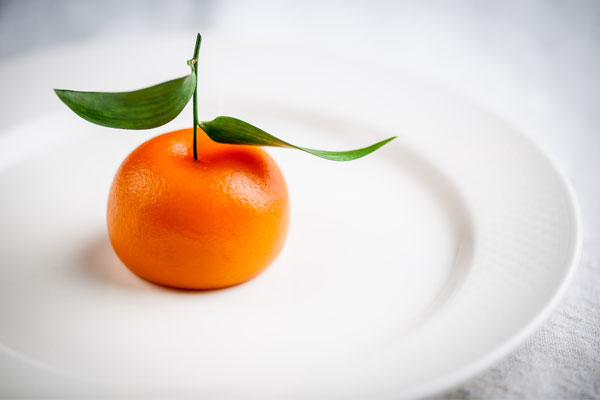
Faking it: Blumenthal's iconic Meat Fruit dish
But more important than all these individual innovations and brilliant dishes is Blumenthal’s constant questioning of established culinary practices and his strive for continual improvement, or as he describes it ‘restless development’. Blumenthal was also among the first chefs in the world to understand the importance of a separate development kitchen and development team.
“The professional kitchen is not creative,” he explains. “It’s a manufacturing line. The Fat Duck is a measured and precise place because we need consistency. All of that is the enemy of creativity. Discovery and creativity needs to take place in an environment that does not have an outcome. You need the freedom to fail.”
The curse of molecular gastronomy
Blumenthal’s career has been characterised by a tempestuous and complicated relationship with the term molecular gastronomy. Originally used as shorthand to tell diners something special was going on in Bray, much to Blumenthal’s frustration it would ultimately be seen as a new and latterly rather dated style of cooking.
“It became so misunderstood. It’s got nothing to do with pipettes and test tubes,” he says. “It’s simply the science of cooking. Why do eggs make your soufflé rise? What happens to a bit of meat when you put it over fire? It’s not a style of cooking.”
Frustrated by a term that he now sees as meaningless, he worked with Modernist Cuisine author Nathan Myhrvold and On Food and Cooking author Harold McGee to draft a statement called The New Cooking, which was later signed by a number of big-name chefs including Ferran Adrià and Thomas Keller. “Chefs have many tools in their box but it should not determine the style of cooking. This stuff is applicable to a barista, a baker, a sandwich shop worker, a confectioner, or a Michelin-starred restaurant. It does not dictate the genre. We’re going to rewrite it this year.”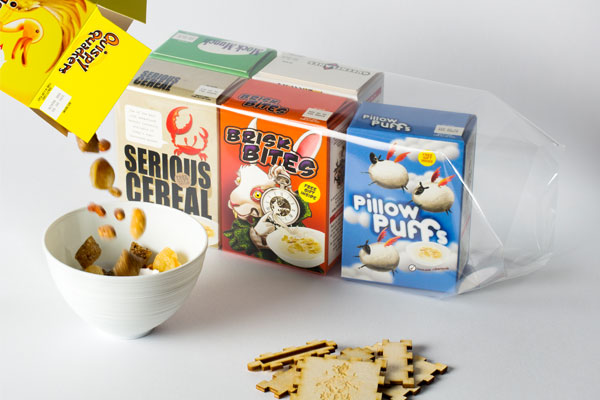
Boxing clever: The Fat Duck's collection of savoury cereals
There’s no question that Blumenthal’s ability to push culinary boundaries has made him one of – if not the most – important chefs of his generation. But one thing that sets him apart from the majority of his top flight gastronomic peers is his ability to make what he does accessible to the general public. No mean feat given the esoteric nature of some of his ideas and the complexity of his techniques.
From his early columns for The Guardian newspaper to his recent mission to make sure astronaut Tim Peake could enjoy a cuppa and a bacon sandwich in zero gravity, Blumenthal and his team’s exploits have been well documented. His media output ranges from the fun but slightly pointless – “let’s build a life-size ginger bread house!” – to some of the most original food and drink programming of the era, not least the brilliant In Search of Perfection series for the BBC, where Blumenthal and team created ‘perfect’ versions of everyday dishes.
His work with British supermarket chain Waitrose reaches an audience of which most three-star chefs could only dream. Since 2010, he and his development team have been designing dishes for the upmarket supermarket chain, bringing unusual flavour combinations – most recently a headline-grabbing banana and bacon trifle – to the mass market. Cleverly, Blumenthal has rolled the research for Waitrose into his development work for his two pubs, the Michelin-starred The Hinds Head and the more everyday The Crown, both in Bray.
Blumenthal has never had a problem with sharing his ideas, techniques and recipes with his peers and the wider world. Indeed, his career has been characterised by openness. “I’ve always found it amusing when chefs accuse others of stealing their recipes,” he says. “If you’ve come up with an idea, it will inevitably be one that was sparked off by doing someone else’s idea. That’s how evolution works. You bounce ideas off each other, that’s what’s always got me out of bed in the morning.” 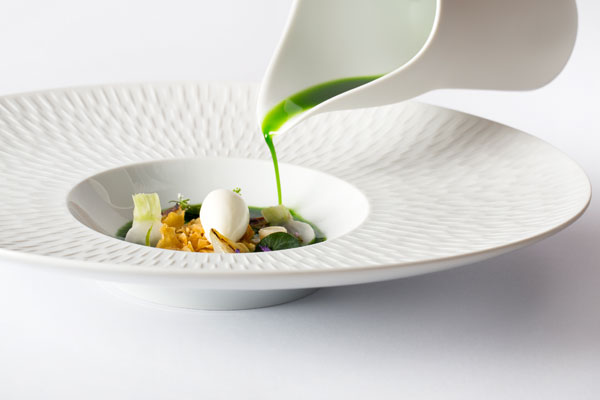
Artichoke ice cream, anyone? The Fat Duck's Just The Tonic! dish
How The Fat Duck changed Heston
The awkward 16th-century building that houses The Fat Duck has a lot to answer for. Some of Blumenthal’s earliest innovations were designed to get around the challenges the former pub presented. For example, he first started experimenting with liquid nitrogen because the low-poured domestic-grade gas supply at the restaurant was stopping him from preparing green beans in the traditional manner. “The Fat Duck has been my life,” he says. “The restaurant has shaped me more than any other thing or person on this planet. It’s housed a lot of my memories. In fact, the whole thing is based on memories and emotions now.”
Over the two decades The Fat Duck has been open, Blumenthal has delved deeper into memory and more specifically nostalgia. The most notable change at the new incarnation is the introduction of a single narrative thread that binds the whole experience. The meal is based on a fairytale holiday, something he believes everybody can relate to.
The whole experience is designed to trigger nostalgia, which Blumenthal believes is potent stuff. “Auschwitz survivors said that while they were in the camp the thing that kept them the most warm was nostalgia,” he explains. “Accessing a happy memory can warm you up, that’s been scientifically proven. Memory is thought of as a dusty treasure chest that we’re supposed to hide away. In fact, we should be accessing memories all the time. We should be looking at our lives in both directions.”
Leaving a legacy
This brings us neatly to the subject of legacy. In spite of all the culinary wizardry, the rotary evaporators, the centrifuges, the dry ice, Blumenthal wants to be remembered for one simple but very important idea – ‘multi-sensory cooking’. And, again rather neatly, it all leads back to an experience in a three-Michelin-star restaurant in Provence when he was 16. The food was amazing, sure, but there was more to it than that. The smell of lavender in the air. The sound of the cicadas. The quality of the light. It was here that the idea of multi-sensory cooking germinated.
Four decades later, he’s still piecing the jigsaw puzzle together. “It’s so massive. It’s what we’ve been doing for the past 15 years. The senses are all ingredients – what we hear, smell, see, and touch. All of that plays a major role in the enjoyment of food. I want to control what diners feel. It sounds cheesy, but restaurants are in the business of emotions. I want to leave this world a happier place than I found it.”
The single dish that sums up the multi-sensory approach is Sound of the Sea, first served in 2007 and still on the menu now, albeit in a slightly different guise. It is, by extension, the dish Blumenthal is most pleased with. Seafood, kelp, seaweed and edible sand are plated to resemble the seashore and served alongside an iPod in a conch shell, which plays sounds of seagulls and the ocean waves.
“It proved that it was possible in a restaurant environment to change the taste of the food by playing with the other senses,” he says. “That realisation of cooking and eating being a multi-sensory experience when nobody else had even considered it. What I’m working on now is all about imagination and our shared belief systems. There’s a lot more to explore.”
A blueprint for another restaurant
Blumenthal has been quoted saying that there will never be another The Fat Duck, but he says that he has toyed with the idea of opening another restaurant of comparable ambition.
“One of the limitations of this business is what we expect from restaurants. We need to put things in boxes. A restaurant is somewhere you go and the waiter gives you a menu, you eat, you pay the bill and then you go. When you start to change the basics, people get confused. But, ultimately, what we’re doing is trying to give people pleasure. And I believe the best way to do that is by ripping up that traditional model.”
Some years ago, he produced a blueprint for a new restaurant where the diner would effectively become part of the development team. Using experimental psychologists, neural imaging and contextual narrative work, the idea was to create a sandpit in which his customers could explore their food memories.
“We can make some diners cry with happiness by triggering a specific, wonderful memory,” he says. “The next stage is to do that to every single person in the restaurant. To do that, you need to find their triggers. It could be a sound, it could be a smell, it could be a touch.”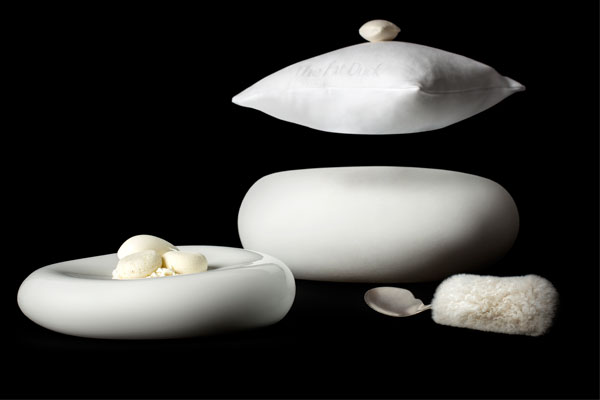
Pillow talk: One of Blumenthal's new multi-sensory dishes is designed to trigger memories of infancy
He went as far as buying the cottage next door to the The Fat Duck to open it. “I didn’t go through with it in the end, partly because the building was falling down and also because it would be impossible to do these things in a normal restaurant environment with chairs and tables,” he says. “It would be something else – an experience.”
The next restaurant Blumenthal is likely to open will be another Dinner, which was always intended to be a growth brand with a vague plan to get to four or five. He has been inundated with offers, but he and Dinner’s long-standing head chef and right-hand man Ashley Palmer-Watts have bided their time.
“I haven’t opened a lot of restaurants in a short space of time, he says. “The first I did outside of Bray was Dinner in 2010, 15 years after I opened The Fat Duck. It takes a long time to get everything in place.” One reason for the gap is Heston’s numerous other pursuits, not least his extensive TV work, with media outlets lapping up the bald-headed, mad scientist persona. He’s embraced this caricature to some extent, but it is a caricature, he insists.
“There is a disconnect between how I am and how I have been portrayed in the wider media,” he says. “It reflects elements of my character. I’m a big kid and I’m inquisitive. The whole nutty professor thing is amusing because I failed my chemistry O-Level. I was too busy asking questions.”
The Fat Duck
High St
Bray
Berkshire SL6 2AQ
+44 1628 580333
thefatduck.co.uk
Dinner by Heston Blumenthal
Mandarin Oriental Hyde Park
66 Knightsbridge
London SW1X 7LA
+44 20 7201 3833
dinnerbyheston.com
A longer version of this article was originally published in Restaurant magazine.
